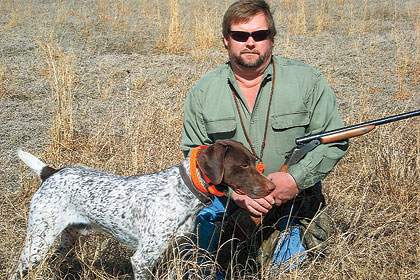By James B. Spencer
"A hardmouthed dog," Brad said, "might really clamp down on a bird; he might chew it; or he might refuse to give it up. The dog that just rolls a bird around in his mouth, without clamping down or chewing, is not hardmouthed, although he does exhibit an undesirable behavior."
 Brad Baxter |
Brad said that some dogs are inclined by heredity to become hardmouthed. For example, dogs that are genetically wired to be nervous and spooky are very apt to develop this problem. Then, too, dogs with little or no natural retrieving instinct frequently eat shot birds where they fall, with no thought of retrieving them.
An unfortunate incident while hunting can lead to hardmouth. If a normally soft-mouthed dog retrieves a lively crippled pheasant and gets repeatedly spurred as he returns with it, he will, in self-defense, bite down and kill the bird. That can be the beginning of a bad habit. Or, if two young dogs try to retrieve the same bird, they will almost certainly play tug-of-war with it, which will start both of them down the road to hardmouth. Of course, this is a handler error that could have been avoided.
Brad added that the most common handler error leading to hardmouth is jerking a bird from the dog's mouth when he delivers it.
"Never get in a hurry to take a bird from your dog's mouth," he said. "Instead, pet and praise him a while. Then, instead of pulling the bird from his mouth, push on it until he backs off. Next, wrap your hand around the bird so that, if he grabs at it, he'll get your hand, not the bird. That will discourage grabbing and snapping at delivered birds."
Other handler mistakes can cause hardmouth. For example, you should never play tug-of-war with your puppy (or grown dog) with anything, be it bird, retrieving dummy or toy.
For obvious reasons, tug-of-war will really encourage any pup (or dog) to clamp down, and once he starts doing that, he's headed straight for hardmouth. Then too, if you're an inexperienced trainer and attempt to force-fetch your dog without an adequate understanding of the process, you'll most likely make mistakes, especially in the timing of corrections that can cause either hardmouth or sloppy-mouth.
Further, when hunting, you should never give your dog play-retrieves with a shot-up bird.
If he's picked up and delivered such a bird without damaging it, you should count your blessings, stuff the bird in your gamebag, and continue hunting.
| Hardmouth In Retrievers | 

Don't miss tips for your retriever, here, and your spaniel, here.
|
|
"So much for prevention," Brad said. "Now for your options in cures. If your dog develops hardmouth, first determine the cause, for only then can you decide how to deal with the problem.
"If it's hereditary, especially if yours is a nervous, fearful dog, you should certainly consider replacing him with a dog having a better temperament. If a hunting incident or handler error caused the problem, the cure is force-fetch training, during which you should discontinue all regular retrieving."
Brad feels that if you aren't experienced in force-fetch, you should seek the assistance of a competent pro trainer. Hardmouth can be a quick-setting problem. If you were to botch the job on your own, you'd probably make your dog permanently hardmouthed.
Brad's final thought was: "Hardmouth is easier to prevent than to cure. During a dog's first few retrieving sessions, I use a frozen bird, which discourages biting down and getting a taste of the bird's meat."
This tip is from Brad Baxter of S&B Kennels, 125 Golden Kinglet Lane, Cisco, TX 76437; (254) 442-1199; e-mail quaildogman@yahoo.com. Brad has been training pointing breeds and retrievers professionally for 20 years. He trains mostly gun dogs, plus a few young pointing breed field trial prospects. He does not breed dogs.






